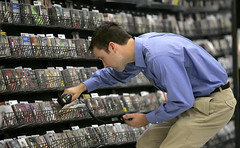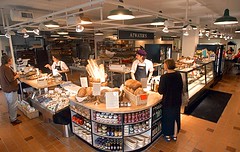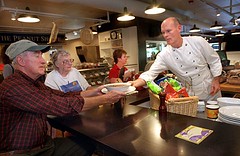Nurturing independent businesses through creatively reducing capital requirements
(This is something I have been meaning to write about for some time, but it's also sparked in part by Brian Miller's response to the entry on "Inner city's inner strengths mined.")
One of the problems in creating independent businesses is that the scale of chain competitors is so large that it is hard to compete on the same playing field. One way to address this is to specialize and be small, such as a cookbook and gardening bookstore or a mystery bookstore, but it can be difficult to succeed in small markets.

Handleman Company Sales Representative Matthew Bashioum of Troy manages CD inventory at Wal-Mart store 2873 at 2001 W. Maple Rd. in Troy, Friday morning, 10/28/05. (Todd McInturf/The Detroit News).
Leased departments. In the old days, department and discount stores (Kmart, Korvettes, etc.) didn't run all of their departments in a store. They had what they called "leased departments," which were leased to and stocked and managed by third party companies such as Handleman, which had a very close relationship with Kmart Corporation for decades. Typically book and jewelry departments in large department stores were run by separate companies and often still, branded cosmetics counters may be run by the Cosmetic Manufacturer. This model still has legs...
Silver Spring Books in Silver Spring is actually managed differently than depicted in some of the George Pelecanos books. It's run as a type of business cooperative. Three separate owners of the store own bookshelves, stock them with books, and spend two days/week running the store. Each book is tagged by the owner so that accounts are properly settled. While each owner has a specialty, they can stock and sell any type of book. What customers see is a bookstore with breadth, whereas the three owners individually could not likely provide such breadth, by working together in a way that is invisible to customers, each must provide only 1/3 of the amount of money necessary to outfit and stock a bookstore.
Similarly, there is an antiques store on Antiques Row in Kensington, Maryland that rents individual rooms to different proprietors. There is one clerk and cash register, but this way a much greater breadth of inventory can be offered. The Hoopla gift store on Barracks Row on 8th Street SE does the same thing.
Finally, there is the example of Belvedere Square in Baltimore. This is a "market" that is privately run. Just like a public market like Lexington Market or Eastern Market, each "stall" is privately owned and managed.
The difference is that Belvedere Square is something like an upscale Dean and Deluca. Not in that it is one store, with leased departments. At Belvedere Square there are 11 different stores, ranging from Atwater's Breads and Soups, Ceriello Fine Foods, to the Grand Cru wine shop.

Customers peruse the selection of great breads at Atwater's in the Belvedere Square Market.(Sun photo by Doug Kapustin)
While you can rip on this as just more "gentrification," think about it. You're trying to attract a supermarket to your community. Few independent business people can muster the money required to outfit a 15,000-30,000 square foot singly-branded supermarket (this requires upwards of $2.5 million). But you can probably find a number of different entrepreneurs to run their own sections, from produce to meats and poultries. One of the shops made fresh orange juice right before your eyes. The only thing the array of stores is missing at Belvedere Square is a dry goods section.

Customers get homemade soups from Ploughboy Soups in the Belvedere Square Market.(Sun photo by Jed Kirschbaum)
Here is a way to reduce the amount of capital needed to open a "supermarket," while providing entrepreneurship opportunities and a great retail experience--"retailtainment"--besides. (At the same time, it sets higher expectations for customer experiences that most of the stalls in Baltimore's six public markets aren't meeting...
Cross Street Market is a cool public market, in the heart of the most successful neighborhood commercial district in Baltimore, Federal Hill. But the vendors in the market are having a difficult time changing to meet the needs of new customers (Cross Street Market is a couple buildings down from a Vespa dealership...) and the upper income residents of the area are shopping instead at the Whole Foods Market that is 1.5 miles away.
Labels: entrepreneurialism



1 Comments:
they do not care if towing too heavy of a trailer will cause damage to your vehicle or be a safety hazard to you and your family, not to mention other people on the road. Food Truck Wedding
Post a Comment
<< Home